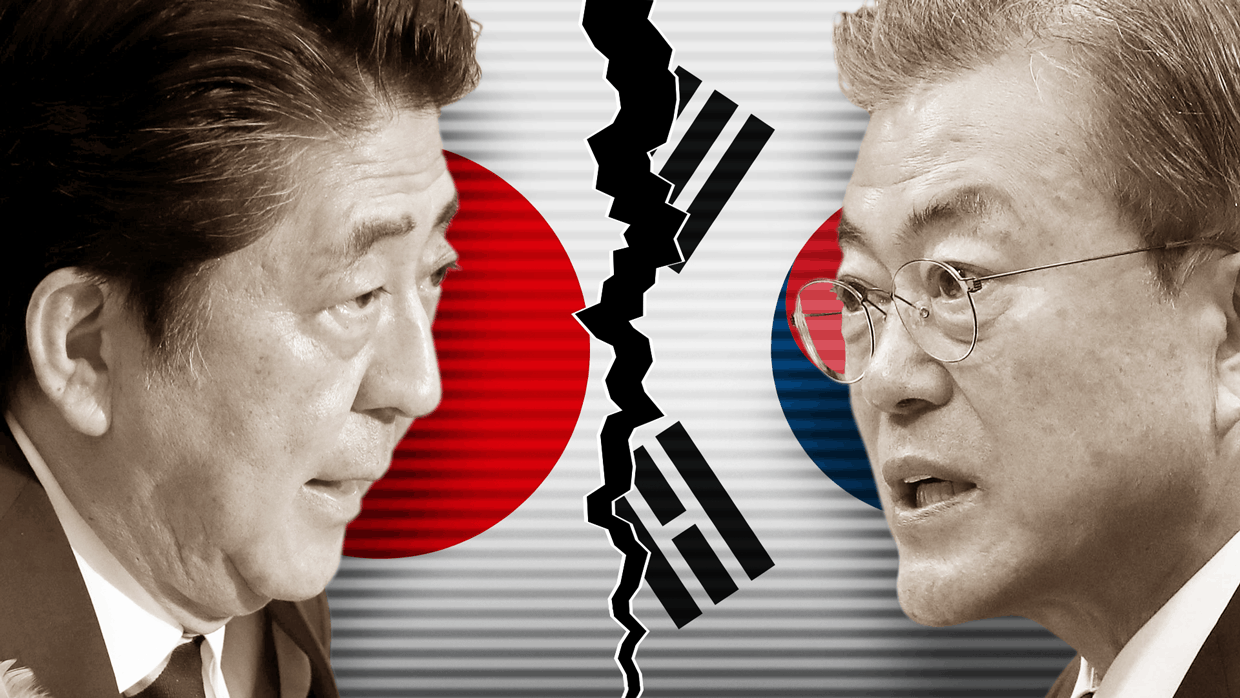Causes and Consequences of South Korea and Japan’s Trade War

Tensions between South Korea and Japan have continued not only in the current trade war, but because of also Japanese occupation in the Korean peninsula in the past. Currently, South Korea has demanded compensation from Japan for Korean workers forced by Japanese companies such as Mitsubishi during World War II. Japan, on the other hand, made its move without delay. Earlier this month, Japan announced it would remove South Korea from white list of favoured trading partners – prompting a similar move from Seoul. In July, Japan imposed export controls on materials used for memory chips and display screens – vital for South Korean companies like Samsung.[1]
Many experts say that this tension is unnecessary because the two countries with a vibrant economy will stagnate the international market. Both countries are very close socially and economically. Considering the number of tourists coming to both countries in 2018; The most tourists are come from Japan after China in the South Korea.[2] Again in Japan, the most popular tourists after the Chinese are Koreans.[3] Despite such a great economic and social relationship between the two countries, there is still a sense of former hostility towards governments.
A record 74 per cent of Japanese were now distrustful of South Koreans, found the study by the Yomiuri Shimbun in Japan and the Hankook Ilbo in Korea. Meanwhile, 75 per cent of South Koreans had no trust in the Japanese, down from 79 per cent last year.[4] South Korea still has not forgotten that during the Second World War, Korean women were used as sex slaves by Japanese soldiers, and that many Koreans were forced to work as laborers in poor conditions. They requested compensation for the workers and apology for Korean women. Japan has repeatedly said that they apologize to Korean women and that the aid fund has been paid for them before. They also stated that the grants, donations and credits transferred to South Korea in 1965 with the agreement for the normalization of diplomatic relations in the two countries were of war compensation.[5]
Despite all this, South Korea said on 22nd August that it would abandon a military intelligence-sharing pact with Japan.[6] In contrast, the answer came without delay in the US front. U.S. Secretary of State Mike Pompeo urged the two countries to work out their differences on Thursday(22nd August), saying “there is no doubt that the shared interests of Japan and South Korea are important, and they’re important to the United States of America.”[7] America is the most important ally for South Korea and Japan. It took two and a half years for the Trump administration to appoint the Undersecretary for Asia and Pacific Affairs. According to Asian expert Benjamin Katzeff Silberstein, if someone had been looking at the area from the very beginning, it would have been able to foresee the crisis soon and lower blood pressure.[8]
The escalating diplomatic relations between Tokyo and Seoul, as I said at the outset, have increasingly caused both economic and social tensions. On top of that, after the latest statements, the security crisis between the two countries occurred. Kim You-geun, first deputy chief of South Korea’s National Security Council, said his country had decided to terminate the intelligence-sharing deal because the trade restrictions had “Caused an important change in security-related cooperation between the two countries. Our government has concluded that it does not conform with our national interest to maintain the agreement struck for the purpose of sharing sensitive military intelligence.”[9]
As a result, as diplomatically what both countries say and do affects the security, economy and socio-cultural relations of their countries. It is unthinkable that the United States, the most important ally, can solve this problem alone. But considering the US activities with Japan and South Korea today, it needs to solve this crisis. In the global world of the 21st century, considering the advantage of good diplomatic communication, we hope that both countries will return from their mistakes without great harm. Thus, Seoul and Tokyo also strengthen their ties and contribute to international relations in every respect.
[1] BBC. (2019, August 23). South Korea and Japan’s feud explained. Retrieved from BBC News : https://www.bbc.com/news/world-asia-49330531
[2] Yonhap News. (2019, March 22). Number of foreign tourists to S. Korea up 15 pct in February. Retrieved from Yonhap News Agency: https://en.yna.co.kr/view/AEN20190322008900320
[3] Nippon. (2019, January 24). Overseas Visitors to Japan in 2018 Top 31 Million. Retrieved from Nippon News: https://www.nippon.com/en/japan-data/h00375/overseas-visitors-to-japan-in-2018-top-31-million.html
[4] Ryall, J. (2019, June 12). 3 in 4 Japanese distrust South Koreans – and the feeling’s mutual. Retrieved from South China Morning Post: https://www.scmp.com/news/asia/east-asia/article/3014195/3-4-japanese-distrust-south-koreans-and-feelings-mutual
[5] TRT Haber. (2019, July 9). Japonya Güney Kore’ye getirdiği ithalat kısıtlamasından geri adım atmıyor. Retrieved from TRT Haber: https://www.trthaber.com/haber/dunya/japonya-guney-koreye-getirdigi-ithalat-kisitlamasindan-geri-adim-atmiyor-422433.html
[6] The New York Times. (2019, August 22). South Korea Says It Will End Intelligence-Sharing Deal With Japan, Adding to Tensions. Retrieved from The New York Times News: https://www.nytimes.com/2019/08/22/world/asia/south-korea-japan-intelligence.html
[7] CNBC News. (2019, August 23). South Korea is scrapping a security deal with Japan — here’s why it matters. Retrieved from CNBC News: https://www.cnbc.com/2019/08/23/what-is-the-korea-japan-intelligence-sharing-agreement.html
[8] Silberstein, B. K. (2019, July 30). Tensions between South Korea and Japan Benefit No One. Retrieved from Foreign Policy Research Institute: https://www.fpri.org/article/2019/07/tensions-between-south-korea-and-japan-benefit-no-one/
[9] The New York Times. (2019, August 22). South Korea Says It Will End Intelligence-Sharing Deal With Japan, Adding to Tensions. Retrieved from The New York Times News: https://www.nytimes.com/2019/08/22/world/asia/south-korea-japan-intelligence.html




